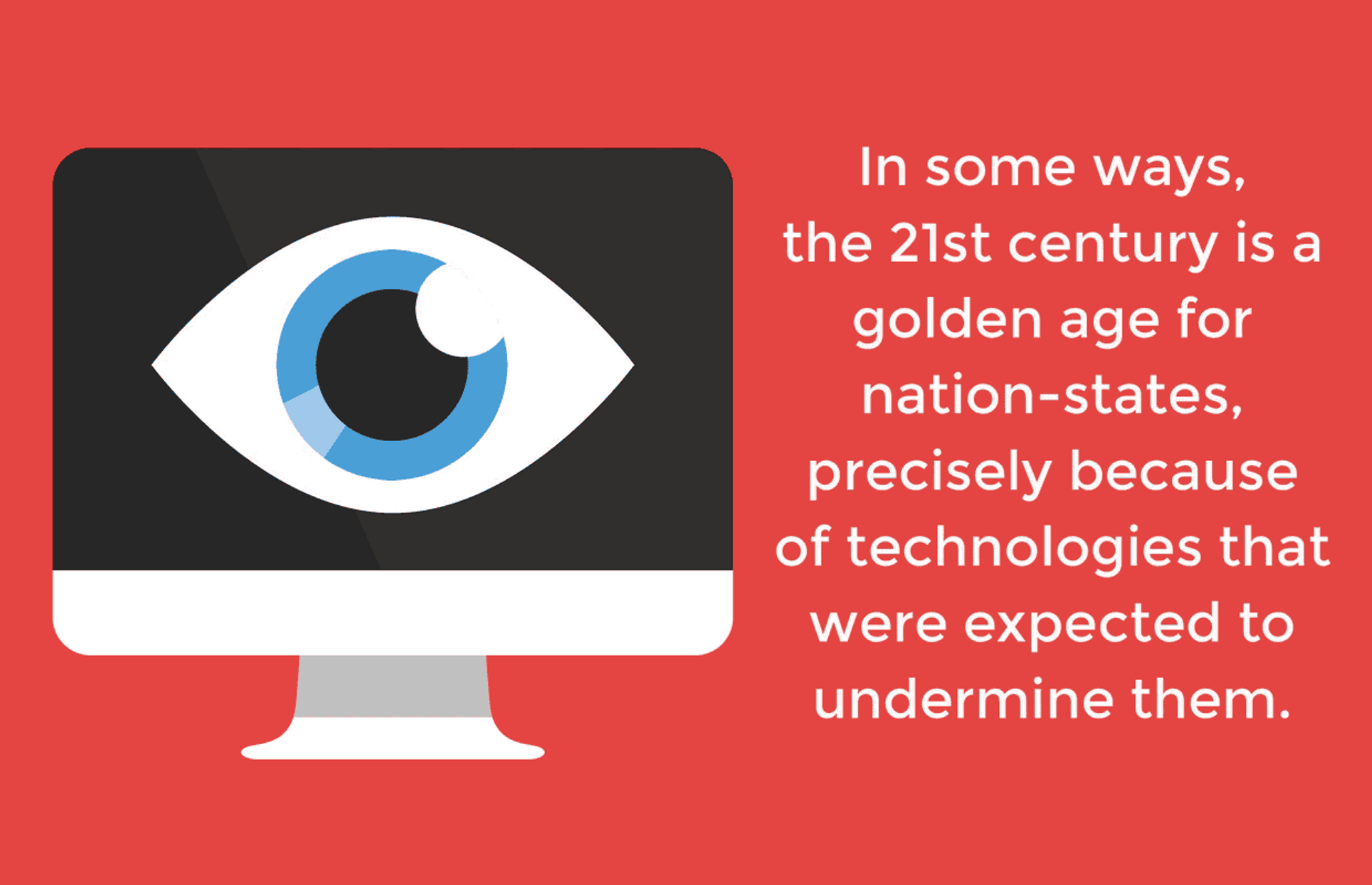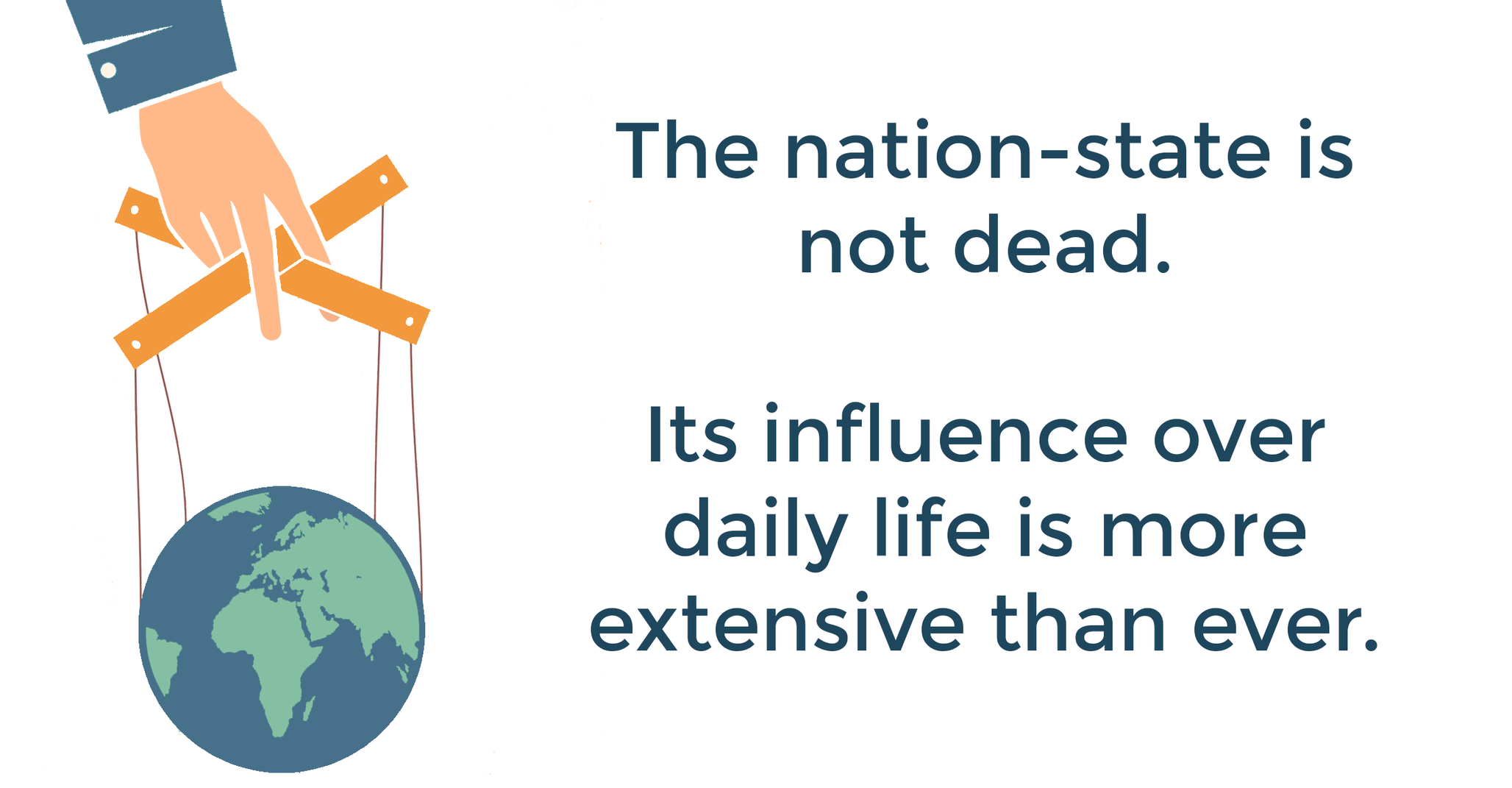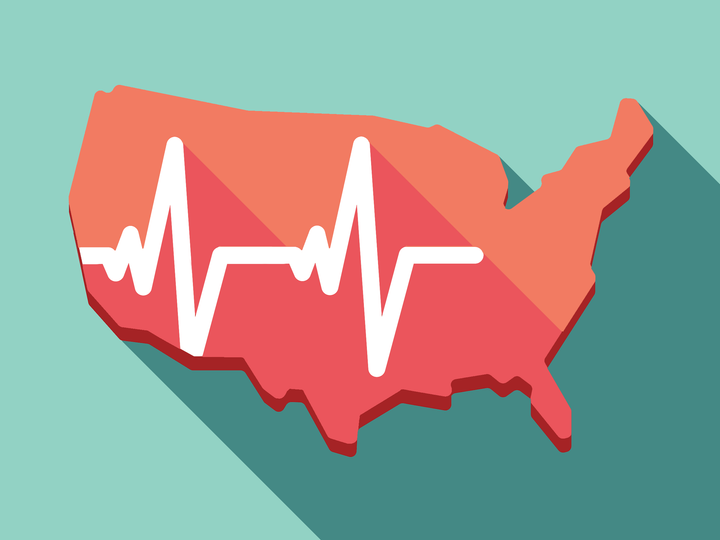The Nation-State: Not Dead Yet
– Alasdair Roberts
In the mid-1990s, many academics declared an end to the nation-state. Twenty years later, the influence of the state over daily life is more extensive than ever.
Twenty years ago, the nation-state was pronounced dead.
Kenichi Ohmae, a Japanese management consultant whose book The End of the Nation-State was published in July 1995, broke the news. “Nation states, have already lost their role as meaningful units of participation in the global economy of today’s borderless world,” Ohmae wrote. “The nation state is increasingly a nostalgic fiction.”
The death certificate was reaffirmed by French diplomat Jean-Marie Guéhenno in his own book, The End of the Nation-State. States had been “bypassed by transnational games,” said Guéhenno, and no longer functioned as “the natural space of solidarity and political control.” The state was “too remote to manage the problems of our daily life … [and] too constrained to confront the global problems that affect us.”
A year later, British academic Susan Strange piled on with her own announcement that world markets were now more powerful than states. “Heads of governments,” warned Strange in 1996’s The Retreat of the State, “may be the last to recognize that they and their ministers have lost the authority over national societies and economies that they used to have.”
What caused the nation-state’s supposed death?
The main culprit was alleged to be economic globalization. In the 1980s and 1990s, governments around the world dismantled barriers to international commerce. The Treaty on European Union came into force in November 1993, followed by the North American Free Trade Agreement in January 1994 and the World Trade Organization (WTO) in 1995. In the United States and Europe, there was handwringing about deindustrialization as container ships queued outside booming Asian seaports. International financiers were strutting in New York and London. James Carville, an advisor to President Bill Clinton, told The Wall Street Journal in 1993 that if he were to be reincarnated, “I want to come back as the bond market. You can intimidate everybody.”
Technological changes had also played a hand. The world was beginning to rewire itself with scant regard for national borders. In 1989, Tim Berners-Lee invented the concept for the World Wide Web. There were only 45 million Internet users in 1995, but this was still three times as many as there had been in 1993, when the first widely used web browser, NCSA Mosaic, was released. The general public was discovering the virtues of electronic mail. (“It has the immediacy and intangibility of a phone call, so you needn’t write for the ages. … it is perfectly acceptable to peck out an unbaked notion, hit a button, and send it off into cyberspace,” Elle magazine assured its readers in 1993). In the developed world, most households now had access to cable television, while newscasters had access to improved satellite technology; the result was pervasive, real-time coverage of events around the world. Pundits spoke of the “CNN effect,” and predicted that it would undermine the autonomy of foreign ministries and military commanders.
The Internet may threaten national sovereignty, but so did the railroad and long-range bomber. The nation-state has always struggled to manage large social & economic forces.
The third cause of the death was said to be the shift in geopolitics in the late 1980s and early ’90s. The Soviet Union, a totalitarian regime that had threatened the West since the end of the Second World War, was the archetype of a strong state, and the Soviet threat stiffened the backbone of the state in the West as well, countering the tendencies toward “indecision, disunity, and disintegration” that many people believed were intrinsic to democratic politics. At the same time, the 40-year conflict caused both superpowers to support autocratic client states in other parts of the world. The end of the Cold War was heralded as a moment of liberation for many nations, but it provoked anxiety, too. Without an existential threat, there appeared to be no real check against the dissipation of order within democratic states, and in relations between them.
The overwhelming impression was that states had lost control over the events around them. Old institutions were crumbling, and old causes and alliances were slipping away. It seemed that governments had surrendered sovereignty over their own territory: money, goods, and information now flowed easily, often invisibly, across national borders. Power had been given up to arbitrageurs in London, technocrats in Brussels and Geneva, and manufacturers in Shenzhen; to well-intentioned global alliances of human rights and environmental activists, and to “dark networks” of radical Islamists, smugglers and money launderers. Many different things were happening at once, and quickly, and uncertainty about what might happen next encouraged hyperbole. It was not enough to predict that the role of the state would change. Instead, the era of the nation-state was said to be “slamming shut.”
The nation-state fights back
This analysis was built on an ignorance of history, which caused many people to exaggerate how much the nation-state had ever had control of events in the world around it. As Karl Marx and Joseph Schumpeter said, the capitalist economy has always been a shapeshifter, constantly metamorphizing and slipping from the grasp of politicians and bureaucracies that want to tame it.
The Internet might have threatened national sovereignty, but so did the advent of railroads and the invention of the long-range nuclear bomber. Borders might have seemed more open in the 1990s than they had been in the 1960s, but they were not nearly as porous as they had been in the 19th century. The international order might have been shaken after the collapse of the Berlin Wall, but not so profoundly as it had been after the First World War, which let loose “blind, irrational and demonic forces,” as Peter Drucker observed in 1939.
The reality is that the nation-state has always struggled to manage large social and economic forces. It does this by building, and then constantly rebuilding, the administrative apparatus of government. This process takes time. In democratic systems, the public must be persuaded that the existing apparatus is inadequate and that certain reforms are necessary. And after this, the exercise of actually constructing new institutions may take years. Look at the American response to the stock market crash of 1929 and the Great Depression: the new architecture for economic management was not completed until the publication of the first Economic Report of the President, in 1947. That is a span of 18 years. It would have been rash to say in the early 1930s that the global economic collapse had conclusively demonstrated the impotence of western democracies. Those nations simply needed time to regain their footing. And yet we made a similar rush to judgment in the mid-1990s: we forecast the death of the nation-state, without allowing for its capacity to adapt and rebound.
And the nation-state has adapted to new conditions, in ways that have preserved its capacity to control territory, people, and events. Consider what has happened to the Internet. In the 1990s, this new technology was heralded as a powerful way of circumventing and challenging state authority. The activist John Perry Barlow issued a “declaration of independence” for the Internet in 1996. “Governments of the World,” it began, “You have no sovereignty where we gather. … You have no moral right to rule us nor do you possess any methods of enforcement that we have true reason to fear.” Barlow did not anticipate the Golden Shield Project run by China’s Ministry of Public Security, which today censors content for 600 million Internet users, and is only one part of the “Great Firewall,” a larger effort to “re-establish the control of the governing authorities.” Nor did he anticipate the massive capacity for Internet surveillance that was built up by democratic nations and revealed by whistleblower Edward Snowden in 2013. Journalist Glenn Greenwald concluded from Snowden’s leaked documents that the U.S. National Security Agency has “one overarching mission: to prevent the slightest piece of electronic communication from evading its systemic grasp.”

The capacity of the state to counter new forms of opposition is often underestimated. For example, some people argued that the Internet would make it easier for officials to leak sensitive information and hold governments accountable for abuses. The WikiLeaks project, and Snowden’s own revelations, seemed to bolster their case. But governments responded by developing sophisticated new methods of “insider threat detection” to prevent further leaks. Antagonists like Snowden (now exiled in Russia) and WikiLeaks’ Julian Assange (marking his third year of involuntary residence in Ecuador’s London embassy, as he evades extradition to Sweden for questioning in sexual assault allegations) were shunted aside. And the leaks themselves proved to be less threatening to the established order than expected. It was a similar story with regard to the alleged capacity of the Internet to enable powerful new forms of social mobilization, such as the anti-globalization and Occupy movements. The activist David Graeber thought that the Internet would help to launch “a vast global uprising against neoliberalism.” And it might have — had governments not responded with a massive and coordinated effort to toughen the policing of mass protests.
In some respects, the new millennium is a golden age for nation-states, precisely because of technologies that were expected to undermine them. The anthropologist James C. Scott wrote in 1998 that the “great achievement of modern statecraft” was the capacity of the state to make society legible — that is, to produce a detailed record of its terrain and all the activity within it. The ability of developed nations to engage in this sort of mapping and surveillance was already well-developed in 1998, but it has improved dramatically since then. Because financial transactions are digitized, economic activity is easier to monitor. Similarly, the behavior of citizens can be analyzed through the vast streams of data that are produced by surveillance cameras, license plate scanners, cell phones, computers, Internet service provider records, television set-top boxes, automotive telematics systems, and other devices. As Scott observed in 1998, legibility matters because it is a precondition for social and economic regulation. The more that a state knows about its domain, the better its ability to govern within it.
Even in the sphere of international affairs, states have maintained their influence. Twenty years ago, there were people who thought that the creation of the WTO marked the advent of a new system of “world government” — a “globe-girdling regime from which there is no escape,” according to the American conservative Pat Buchanan. American journalist-turned-diplomat Strobe Talbott saw the WTO and the International Monetary Fund (IMF) as “protoministries of trade, finance and development for a united world.” But negotiations to extend the power of the WTO have been frustrated since 1995, as nations in the developing — as well as the developed — world have dug in their heels on critical issues. Meanwhile, countries such as Malaysia and Argentina have resisted IMF pressure to adjust their domestic economic policies.
Even in Europe, the nation-state continues to put up a fight. The 1992 Treaty on Economic Union was supposed to impose “binding constraints” on spending and borrowing by Eurozone countries. Enforcement mechanisms for these rules were strengthened by the 1997 Stability and Growth Pact, which was initially praised as “one of the most remarkable pieces of policy coordination in world history.” However, after the world economy slowed in 2001, major Eurozone countries ignored these rules. (One observer wrote that the rules were “set aside when they clashed with economic and political reality.”)
In 2007, European finance ministers insisted these fiscal rules were still “a key priority.” But they were again disregarded after the advent of the global financial crisis. The response was yet another strengthening of enforcement mechanisms — first by regulations adopted in 2011, and then by treaty in 2012, and again by regulations adopted in 2013. The 2012 treaty, known as the Fiscal Compact, requires that governments adopt balanced-budget legislation that forces “automatic” corrections when governments deviate from budget targets. But the Compact also recognizes the “prerogatives of national Parliaments” to decide whether corrections should be adjusted in exceptional circumstances. Once again, nation-states insisted on having the last word.
Of course, there are other ways in which nation-states have asserted themselves. The United States did not hesitate to flex its military power after the terrorist attacks of September 11, 2001. A year and a half later, many jurists doubted that an American invasion of Iraq could be justified under international law. The planned invasion also triggered global protests that were, according to the political scientist Sidney Tarrow, “the largest example of collective action in history.” Still, the invasion went ahead. President George W. Bush responded to the international protests by insisting that he would not “decide policy based upon a focus group,” and at the start, most Americans agreed with him. President Vladimir Putin showed similar disregard for international opinion when Russia invaded Crimea in 2014.
The nation-state is alive and well
In 1992, Strobe Talbott predicted that “nationhood as we know it” would become obsolete in the 21st century. “All states,” he said, “will recognize a single, global authority.” In reality, what we have seen is a revival of the old game of great power politics. Today, some Americans worry about the growing influence of China, a country that is building up armed forces, asserting sovereignty over land and sea routes, and crafting alliances that secure its access to critical resources. In short, China is behaving like a conventional nation-state. And the United States is responding in like manner by rebuilding its diplomatic and military capacities to meet the challenge posed by this rising power. This is a “substantial national project,” according to Kurt Campbell, a former Obama administration diplomat, that is intended to produce “a vast and dynamic increase in U.S. focus and depth of engagement” in the Asia-Pacific region.
A large number of Americans worry about another issue: the extent to which economic inequality has led to political inequality. Nobel laureate Joseph Stiglitz is one of many people who complains that the American political system has been “captured by moneyed interests.” But this is also an old refrain in American politics. A century ago, there was a strikingly similar debate about the rise of a “new plutocracy.” It is the kind of debate that proceeds on the assumption that the nation-state still matters. After all, we might not care whether government had been captured by the rich if we believed that real power laid elsewhere.

Indeed, Americans would be right to think that there is an air of unreality to the claim that the nation-state has ceased to matter. Many of the vital questions of today’s politics bear on the relationship between the state and the people over whom it asserts authority. How should government deal with illegal immigration and the American-born children of undocumented immigrants? Are racial minorities adequately protected against police abuses? Should gays and lesbians be allowed to marry? Is the right to vote respected? Do citizens have adequate access to affordable healthcare or postsecondary education? Should insolvent debtors be bailed out, or allowed to repudiate their debts?
The nation-state is not dead. The reality is that the influence of the state over daily life is more extensive than ever, with good consequences as well as bad. Certainly, nation-states are susceptible to influence from other centers of power, as they always have been. But this does not mean that the autonomy of the state has collapsed.
And so the three questions that have traditionally been at the center of politics are likely to remain there. Who controls the state, and in particular, is it sufficiently responsive to public opinion? How do we protect citizens from arbitrary and unfair state action? And how do we reform the administrative apparatus of the state so that it is capable of delivering essential services and managing the powerful forces that operate around it?
* * *
Alasdair Roberts is a professor of law at Suffolk University in Boston. In September 2015, he will become a professor at the Truman School of Public Affairs at the University of Missouri. His books include The Logic of Discipline: Global Capitalism and the Architecture of Government (Oxford University Press, 2011). His website is http://www.aroberts.us, and he can be followed on Twitter at @AlasdairRoberts.
Cover image courtesy of Shutterstock
